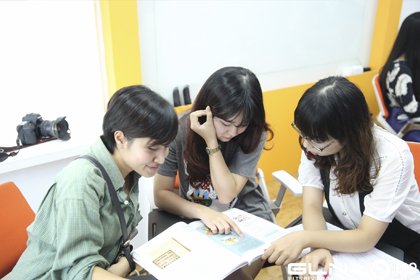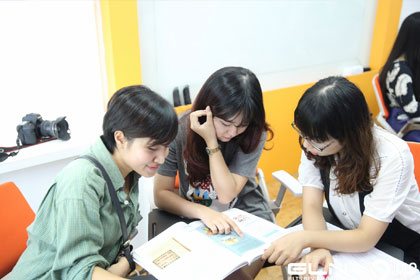Brainstorm (Động não) là một kỹ năng vô cùng quan trọng trong lúc làm bài thi IELTS Writing Task 2 và IELTS Speaking Part 3. Nếu bạn rèn luyện cho mình kỹ năng này tốt thì sẽ dễ dàng trong hầu hết tất cả mọi việc, kể cả là Writing Task 2 và Speaking Part 3. Thế nhưng, không phải lúc nào bạn cũng có thể đưa ra được những ý tưởng tuyệt vời - mà là đưa ra hằng trăm ý tưởng tồi.
Mấu chốt là bạn phải vượt qua được những ý tưởng tồi để có được ý tưởng tốt. Đừng nản chí, nếu biết cố gắng bạn sẽ đạt được những điều tốt đẹp. Cùng JOLO chỉ cho bạn những tips giúp bạn có thể áp dụng trong phần Speaking Part 3 này nhé!

Change your Perspective
Đây là một chiến thuật khá phổ biến và nổi tiếng. Giả sử, đặt vào một tình huống phải đưa ra lựa chọn giữa việc săn bắn con huơu và hãy để cho nó chạy thoát, bạn sẽ làm gì với tình huống đó. Hãy tưởng tượng rằng bạn là người đang xem xét tình huống đó.
Example:
A hunter might say ‘No, because it is a traditional activity handed down for generations that has many benefits related to family bonding and personal enjoyment.’
A cop might say ‘Yes, because it allows people to buy powerful guns that can then be used in violent crimes.’
A doctor might say ‘Yes, because there are countless hunting injuries each year, and these often involve people who were not even hunting.’
A liberal-wuss might say ‘Yes, because we share the earth with animals – we do not own them.’
A child might say ‘It is simply wrong to hurt animals because they are cute and friendly.’
A person from the past might say ‘Animals should only be killed to be eaten.’
A person in a poor country might say ‘There isn’t enough time or money to spend hunting for fun.’
I would say ‘[fill in your opinion here]’
Thấy không, từ việc thay đổi góc nhìn như vậy sẽ cho vô số ý tưởng tuyệt vời và dễ dàng. Hãy cố gắng áp dụng nó trong Writing Task 2 nữa nhé.
Question Words
Who? Where? Why? When? How? How much/many? What? Which?. Sử dụng những từ nghi vấn này để tạo ra ý tưởng thêm cho mình. Hãy cùng lấy ví dụ tiếp về tình huống săn bắn nhé. Nếu trong đề thi IELTS là câu hỏi này: “Should we ban hunting for sport/fun?”. Tự hỏi bản thân bằng những câu sau này nhé:
“Who wants to ban hunting? Who doesn’t?”
“Where is hunting common?”
“Why do people hunt? Why do people want to band hunting?”
“How do most people hunt? Is it dangerous?”
“How much does hunting cost? How many animals are killed every year?”
“What would happen if hunting was banned? What if it becomes more popular?”
“Which countries hunt the most? Does this have an effect?”
Điều này làm cho việc nảy ra ý tưởng thực sự hay và trở nên dễ dàng hơn rất nhiều!
Wishful Thinking
Hãy suy nghĩ về giải pháp lý tưởng hoặc hoàn hảo. Cùng xem câu hỏi và câu trả lời mẫu dưới đây nhé:
“Will people in the future continue to live in the city rather than the countryside?”
=> “The ideal future would be most people living in cities for work but still large populations outside the cities so that they are not too crowded. Maybe people will live outside cities if there are more opportunities for work there.”
Hoặc bạn có thể nghĩ đến điều tồi tệ nhất có thể xảy ra trong phần câu trả lời của câu hỏi đó cũng sẽ giúp bạn nảy ra ý tưởng.
Word Links/ Associations
Là một phương pháp cổ điển. Viết từ chính liên quan đến chủ đề, ví dụ:”pollution”. Bây giờ hãy viết ra tất cả các từ mà bạn thường liên tưởng đến từ này - climate change, governments, corporations, taxes, fossil fuels,.... Bằng cách đó sẽ tạo ra cho mình cơ sở cho các ý chính và hỗ trợ trong bài nói của bạn.

Reverse Thinking (Tư duy ngược)
Hiểu đơn giản đó là nên tìm giải pháp ngược lại về trọng tâm vấn đề đó. Ví dụ: “How could governments encourage people to go to museums more often?”. Thay vì ta tìm giải pháp để người dân đi, thì ta nên tìm giải pháp chính phủ nên làm gì để người dân có thể đi tới bảo tàng thường xuyên hơn. Dưới đây là câu trả lời ví dụ:
“By building better, more interesting museums. To do this they could include more interactive exhibitions, update the items in museums more often, make sure museums are free on certain days of the week and advertise the museums better.”
Bài mẫu cho IELTS Speaking Part 3
A, Tình yêu, hẹn hò và hôn nhân
- If you are 35 years old without marriage, do you still waiting for your true love? Why?
I would say it might be the case since I’d prefer to stay single rather than end up with the wrong person. It is not a surprise, I believe, because there are plenty of people who still enjoy their every moment without a life partner. On the one hand, the number of divorces or unhappy marriages have been increasing tremendously over the years and its consequences are upsetting such as dysfunctional family, domestic violence, child neglect and the list could go on. On the other hand, people can find happiness in different places and activities without committing their life to one particular person, especially those who aren’t worth it. Therefore, I wouldn’t settle for anything less than what I deserve.
- Who will pay for the wedding cost? Man or woman or both? Why?
Budget planning for weddings can be an extreme headache and deciding who pays what might not be easy since there are tons of expenses to cover such as the rings, floral arrangements, honeymoon and so on. Hence, I believe depending on each couple’s financial status, they should carefully discuss and choose a cost-splitting option that works best for them. For example, if both are financially abundant, they can share the cost equally. Otherwise, one who is more well-off can cover a greater portion of the expense.
- What is the best age to get married?
I don’t believe that there is a right time for anything, marriage included. It’s more about the maturity of the two people than the age itself, I think. People mature at different rates, physically and emotionally, and not until after they can fully acknowledge their life issues and handle them with rationale and thorough consideration, are they ready to get settled and find happiness in their marriage life. Besides, financial situation also plays a significant part in this once-in-a-lifetime decision. Many divorces have been directly resulted from the lack of money or financial insecurity. Therefore, only when people can fully support themselves, should they consider to start a family.
B, Động vật và thú cưng
- Do many people in China like to have a pet?
I think the number of Chinese who like pets is less than half the total population. Many Chinese are afraid of common pets. I think it’s very funny, but some are scared of animals, even very tiny and harmless ones. This may be because of something in their childhood, I don’t know. Many people in China like pets, but not the majority, for sure.
- What kinds of pets are the most popular in China?
Dogs and cats are by far the most common. I think the single most common pet is either the Pekingese dog or the Pug dog. I think they are both quite ugly, but sometimes they’re so ugly they’re cute. A lot of people also keep guard dogs to protect their property.
- What are some of the advantages and disadvantages of having a pet?
A pet can be a good friend: sometimes the best friend. Pets are also great playmates for children. I think it’s very good for kids to have a pet when growing up. The disadvantages are that pets are expensive to feed and care for, and require a lot of time, depending on the kind of pet.
Ưu đãi và lợi ích khác khi tham gia khoá học Summer Camp (THỜI GIAN ĐẾN HẾT 30/04, SAU ĐÓ SẼ CHUYỂN THÀNH 30% ĐẾN HẾT 31/05)
Dành cho những bạn nhỏ có độ tuổi từ (03-14)
- Ưu đãi lên đến 35% trừ thẳng vào học phí Summer Camp dành cho 30 bạn đăng ký sớm nhất. Chi tiết về các khoá học cho trẻ nhấn vào đường link ngay bên cạnh: Khoá học tiếng Anh cho trẻ
- Bộ quà tặng nhập học: Sổ, bút chì, Balo,...
- Với 72h giờ học tương đương với 4 tuần, học sinh sẽ hấp thụ lượng ngôn ngữ tương đương 06 tháng học tiếng Anh thông thường.
- 01 lớp học, 03 giáo viên: Giáo viên người nước ngoài là các thạc sĩ ngôn ngữ với ít nhất 03 năm kinh nghiệm giảng dạy.
- Được thưởng thức bữa trưa đa dạng, cung cấp đầy đủ dưỡng chất cho các bạn nhỏ. Ngoài ra còn có thử thách ’’ăn hết suất’’ sẽ là trải nghiệm tuyệt vời cho con thêm trách nhiệm và quý trọng thức ăn.
- Dịch vụ đưa đón xe bus: JOLO sẽ triển khai hoạt động đưa đón học sinh bằng xe bus, thuận tiện tiết kiệm thời gian cho ba mẹ và an toàn cho các con.
- Dạy kèm ngoài giờ: 50.000 VND/ 30 phút/ 1 học viên.
- Đăng ký lớp học phụ huynh ấn vào ngay bên cạnh: Form đăng ký khoá học
Dành cho những bạn đang ôn luyện IELTS
- Ưu Đãi lên đến 35% trừ thẳng vào học phí IELTS Summer Camp dành cho 30 bạn đăng ký sớm nhất. (Chi tiết chương trình ưu đãi).
- Được Tặng Khóa Học Bổ Trợ Chuyên Sâu Kỹ Năng Speaking / Writing For IELTS trị giá 3.000.000 VNĐ.
- Được Tặng bộ tài liệu IELTS độc quyền từ British Council ( Hội Đồng Anh ).
- Được Hỗ Trợ chi phí thi thử IELTS mocktest định kỳ tại Hệ Thống Trung Tâm Anh Ngữ GLN - JOLO English.
- Được Tham Gia miễn phí các buổi Hội thảo, Training về IELTS cùng các chuyên gia luyện thi IELTS hàng đầu do GLN - JOLO English tổ chức.
- Hỗ trợ trả góp học phí tới 12 tháng - 0% lãi suất - liên kết 18 ngân hàng - Thủ Tục Cực Kỳ Đơn Giản ( Tìm hiểu về chương trình trả góp tại đây )..
- Hotline tư vấn: 0936 187 791 - 0777.181.610.






















